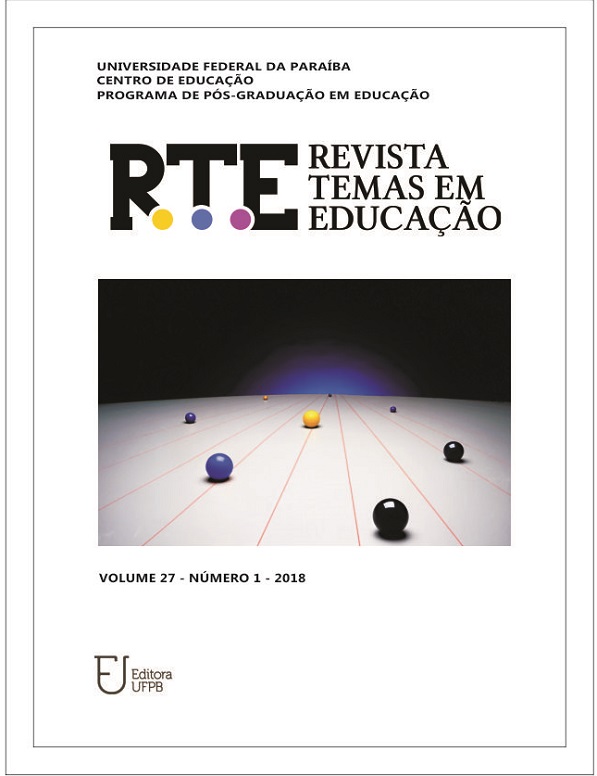TRAGEDY AND RECOGNITION IN THE FORMATIVE TRAJECTORY
TRAGEDY AND RECOGNITION IN THE FORMATIVE TRAJECTORY
DOI:
https://doi.org/10.22478/ufpb.2359-7003.2018v27n1.33496Keywords:
Tragic knowledge, Education, Reserach-trainingAbstract
The article aims to highlight and understand the role of tragic knowledge in formative experience, from the point of view of Jaspers and Ricoeur,and approaches the creative power of the tragic as a project of knowledge present in the life and work of an educator from periphery, articulating with the discussion about the role of school and its relationship with the struggle for social recognition. The interlocution of theoretical and narrative questions is inscribed in the methodological context of research-training, based on the life history.In the discussion, we analyze the impact that the tragic knowledge exerts in the (inter) subjective formation, whose challenge involves redemption or liberation, since tragedy can be overcome by the work of the human being through autopoiesis.
Downloads
References
ARISTÓTELES. Poética. Trad. Eudoro de Sousa. Porto Alegre: Globo, 1966.
BORNHEIM, Gerd A. Breves observações sobre o sentido e a evolução do trágico. In: BORNHEIM, Gerd A. (Org.). O sentido e a máscara. 2. ed. São Paulo: Perspectiva, 1969, p. 69-92.
BATISTA, André Nunes. Direitos Humanos e a luta por reconhecimento: o sentido filosófico dos direitos humanos e a luta por reconhecimento em Axel Honneth. In: Revista Liberdades [online], IBCCRIM, São Paulo, 2012. Disponível em: < http://www.revistaliberdades.org.br/_upload/pdf/11/artigo1.pdf> Acesso em: 14 jul. 2016.
BUNCHAFT, Maria Eugênia. Habermas e Honneth: leitores de Mead. Sociologias [online]. 2014, vol. 16, n. 36, pp. 144-179. Disponível em: http://seer.ufrgs.br/index.php/sociologias/article/view/49661/31067 Acesso em: 14 jul. 2016.
FREIRE, Paulo. Pedagogia do oprimido. 9. ed. Rio de Janeiro: Paz e Terra, 1981.
FREIRE, Paulo. Educação como prática de liberdade. Rio de Janeiro: Paz e Terra, 1975.
HAUSER, Arnold. História social da literatura e da arte. Tomo I. Trad. Walter H. Geenen. São Paulo: Mestre Jou, 1972.
HONNETH, Axel. Luta por reconhecimento: gramática moral dos conflitos sociais. São Paulo, Editora 34, 2009.
JASPERS, Karl. O trágico. Trad. Ronel Alberti da Rosa. Desterro: Ed. Nephelibata, 2004.
JASPERS, Karl. Esencia y formas de lo trágico. Buenos Aires: Editorial Sur, S.R.L., 1960.
JOSSO, Marie-Christine. Experiências de vida e formação. Natal: EDUFRN; São Paulo: Paulus, 2010.
MONTEIRO, Dulcinéa da Mata Ribeiro. Metanóia e meia idade: trevas e luz. São Paulo: Paulus, 2008.
NOLIN, Danielle. O romance de autoformação: um processo do ato criador para a invenção de si. Diálogo, identidade e alteridade no biográfico. In: PASSEGGI, Mariana da Conceição; NOBRE, Tatyana (Org.). Narrativas de formação e saberes biográficos. Natal, Edufrn; São Paulo: Paulus, 2008.
RICOEUR, Paul. Sobre o trágico. Leituras 3: Nas fronteiras da filosofia. São Paulo: Loyola, 1996.
Downloads
Published
How to Cite
Issue
Section
License
Authors who publish in this journal agree to the following terms:
. Authors retain the copyright and grant the journal the right to first publication, with the work simultaneously licensed under the Licença Creative Commons Attribution that allows the sharing of the work with acknowledgment of authorship and initial publication in this magazine. . Authors are authorized to assume additional contracts separately, for non-exclusive distribution of the version of the work published in this journal (eg, publishing in institutional repository or as a book chapter), with acknowledgment of authorship and initial publication in this journal.
. Authors are permitted and encouraged to publish and distribute their work online (eg in institutional repositories or on their personal page) at any point before or during the editorial process, as this can generate productive changes, as well as increase impact and citation of the published work (See O Efeito do Acesso Livre).



















